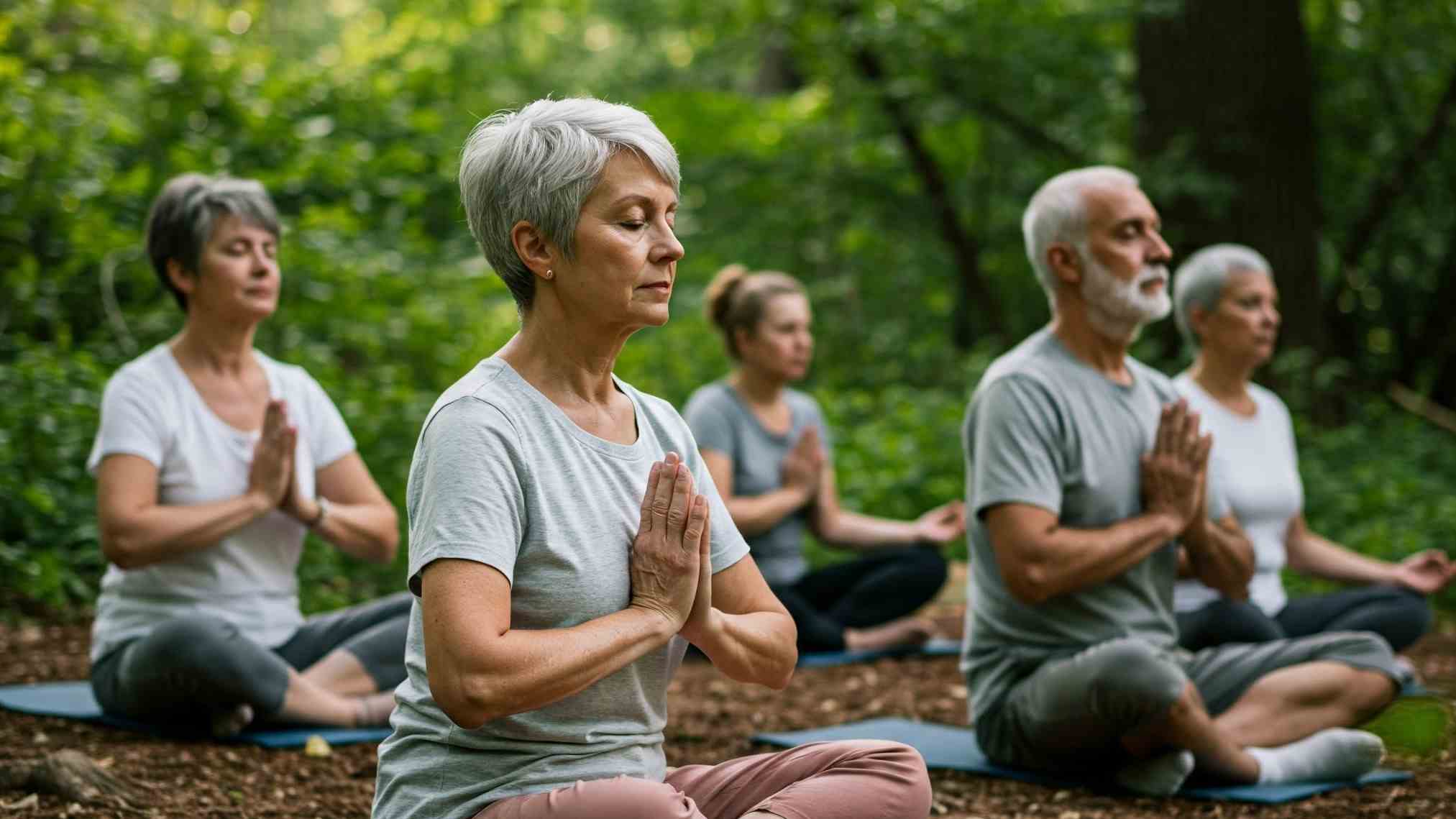As people grow older, maintaining cognitive health becomes a key concern for many. There has been a rise in natural, non-invasive approaches to support the aging brain. Meditation has gained attention as a promising tool to slow neural decline. This cost-effective practice offers a way to nurture mental clarity without medications or medical interventions.
Research exploring meditation’s effects on the brain shows benefits for memory, focus, and emotional balance. This topic is especially relevant for aging adults and their families. These individuals often seek practical ways to enhance quality of life and independence. Meditation’s accessibility makes it appealing. It requires only a few minutes daily and no special equipment.
UCLA and Harvard studies suggest meditation may protect against age-related brain changes, offering hope for seniors worried about memory lapses or slower thinking. Beyond cognitive benefits, meditation supports overall mental wellness. It helps reduce stress and improve sleep, both critical for brain health.
This article explores how meditation can be a game-changer for older adults. We will detail its benefits, practical uses, and integration into daily life. By understanding its potential, we can make informed choices to support long-term brain function and emotional health, fostering a sense of empowerment and well-being.
The Aging Brain: What Really Happens Over Time
The aging brain undergoes natural changes that affect brain function and daily life. Aging adults often experience memory lapses, such as forgetting names or appointments, and they frequently face slower processing speeds. This slower processing makes tasks like multitasking more challenging.
Structurally, the brain may shrink, particularly in the hippocampus (which governs memory) and the prefrontal cortex (which is linked to decision-making). These shifts can lead to difficulties with focus, problem-solving, or emotional regulation. These difficulties impact overall mental wellness.
For example, struggling to manage finances or follow conversations can cause frustration. While these changes are normal, they can escalate and affect independence. Preventive care is crucial to slow neurological decline and maintain cognitive health. Mental exercises, healthy diets, and meditation can help slow this decline.
Chronic stress, a known accelerator of cognitive decline, damages brain cells over time. Practices like meditation can lower stress hormones, protecting neural health. Research shows that aging brains retain some plasticity. It means they can adapt and form new connections with the right stimulation.
By prioritizing cognitive support, seniors can better navigate daily challenges. These range from recalling important details to staying emotionally balanced. Meditation, in particular, stands out as a low-cost, accessible way to bolster brain resilience. It offers hope for keeping mental sharpness and emotional stability well into later years.
Meditation and Its Proven Cognitive Benefits
Meditation is a powerful tool for maintaining brain function in aging adults. By reducing stress, meditation protects against cognitive decline. Chronic stress elevates cortisol, which can harm memory-related brain areas. However, meditation lowers these levels, creating a protective shield.
Studies highlight several cognitive benefits of meditation:
- A Journal of Alzheimer’s Disease study found that seniors practicing meditation for 12 weeks showed improved memory retention and focus compared to non-meditators.
- Similarly, a UCLA study reported less age-related gray matter loss in older meditators, indicating stronger brain health.
These findings suggest meditation enhances cognitive resilience. These cognitive improvements help seniors manage daily tasks like organizing schedules or following conversations. Beyond memory, meditation sharpens attention and decision-making. It’s critical for maintaining independence. Meditation also reduces mental fatigue, allowing seniors to stay engaged longer.
For instance, a trial in Frontiers in Aging Neuroscience showed that regular meditation improved executive function in older adults, aiding complex thinking.
Emotionally, meditation fosters balance. It reduces anxiety that can cloud cognition. For aging adults, these benefits translate to practical improvements. These include better medication management and improved social interactions. Meditation requires only a quiet space and a few minutes. This makes it ideal for seniors seeking non-invasive ways to support health and slow decline.
Mindfulness and Neuroplasticity in Older Adults
Mindfulness is a cornerstone of many meditation practices. It plays a key role in supporting neuroplasticity, the brain’s ability to form new neural connections even in later life.
Mindfulness encourages present-moment awareness, stimulates brain activity, and promotes growth in areas like the prefrontal cortex, which is tied to executive function.
A NeuroImage study found that seniors practicing mindfulness showed increased neural activity. This suggests enhanced cognitive flexibility, which is vital for aging adults. It supports learning new skills, like using techs, or recovering from mental setbacks.
Mindfulness also reduces negative thought patterns. It creates a mental environment conducive to neural growth. For example, by calming worries about memory slips, it lowers stress that might otherwise hinder plasticity. A Brain Research study showed that practitioners had stronger connections between brain regions. It improves resilience against age-related decline.
For seniors, this means better adaptation to life’s changes. This ranges from managing daily tasks to maintaining emotional balance. Practices focusing on breath or body sensations are accessible and require minimal physical effort. This makes them ideal for older adults with mobility issues.
By fostering neural resilience, meditation helps counter neurological decline. It offers a practical way to support mental health and maintain independence in later years.
How Meditation Supports Mental Wellness in Aging Adults
Beyond cognitive benefits, meditation significantly boosts mental wellness in seniors. Aging can bring emotional challenges. These include anxiety over health or loneliness from social changes. Meditation helps by calming the mind and fostering a sense of peace. A study in Frontiers in Psychology found that older adults who meditated reported lower anxiety and better mood stability after just eight weeks.
Improved sleep is another key benefit of meditation. Many seniors struggle with insomnia. It can worsen cognitive decline. Meditation, particularly body scan or guided imagery, promotes relaxation, helping seniors fall asleep faster and stay asleep longer. Better sleep supports memory consolidation and emotional health. It creates a positive cycle for brain function.
Meditation also helps seniors feel more in control of their emotions. For instance, practices teach them to observe thoughts without judgment. It reduces stress from worrying about memory slips. These emotional benefits indirectly protect cognitive health. This happens by lowering the mental strain that can accelerate decline.
To integrate meditation into daily life, seniors can start small. Even five minutes of deep breathing or a guided session can make a difference. Pairing meditation with routine activities helps build consistency. Caregivers can also encourage group sessions at community centers. This can add a social element to boost mood.
Types of Meditation Best Suited for Brain Health
Not all meditation techniques are the same. However, several are particularly effective for supporting mental health in aging adults. Here’s a look at some options and their benefits:
- Mindfulness Meditation. Focuses on present-moment awareness. It’s often through breath or body observation. It enhances attention and emotional regulation. It’s ideal for seniors looking to boost focus and reduce anxiety.
- Guided Imagery. Involves visualizing calming scenes, like a beach or forest. This technique is great for beginners and helps with relaxation and mood stabilization.
- Body Scan. Directs attention to different body parts to release tension. It’s excellent for improving sleep and reducing physical stress. It can support cognitive health.
- Loving-Kindness Meditation. Centers on cultivating compassion for oneself and others. It fosters positive emotions. Those can enhance mental wellness and resilience.
For seniors new to meditation, start with guided sessions. They are widely available through apps or online videos. These sessions provide clear instructions and are easier to follow for those with shorter attention spans. Mobility issues should also be considered. Seated or lying-down practices work well for those with physical limitations. Sessions as short as 5–10 minutes can be effective, making meditation accessible for all.
Incorporating Meditation into a Daily Aging Routine
Incorporating meditation into an aging adult’s daily routine doesn’t have to be difficult. Here are practical tips to make it sustainable:
- Set a Schedule. Choose a consistent time, like morning or before bed, to build a habit. Even 5–10 minutes daily can yield benefits.
- Start Small. Beginners should try short sessions to avoid feeling overwhelmed. Gradually increase duration as comfort grows.
- Use Digital Tools. Apps like Calm, Headspace, or Insight Timer offer guided meditations tailored for seniors. Many include beginner-friendly options and sleep-focused sessions.
- Create a Calm Space. Find a quiet, comfortable spot with minimal distractions. A cozy chair or cushion can make the experience more inviting.
- Involve Caregivers. Family or caregivers can join in or encourage practice. It makes it a shared activity that boosts motivation.
- Track Progress. Keep a simple journal to note changes in mood, sleep, or focus. This helps seniors see the benefits and stay committed.
Expectations should be realistic. Results take time, and some days may feel harder than others. Consistency matters more than perfection. For those with specific concerns about cognitive decline, combining meditation with professional medical care is wise. Consider consulting a neurological specialist, such as those at Lone Star Neurology. They can provide personalized guidance to complement meditation’s benefits.
By making mindfulness a regular part of life, aging adults can support their cognitive health. They can enhance mental wellness and potentially slow neurological decline. Start today with a small step and explore how this simple practice can make a big difference.












I've given up... the stress her office staff has put me through is just not worth it. You can do so much better, please clean house, either change out your office staff, or find a way for them to be more efficient please. You have to do something. This is not how you want to run your practice. It leaves a very bad impression on your business.
Please, leave your review
Write a comment: